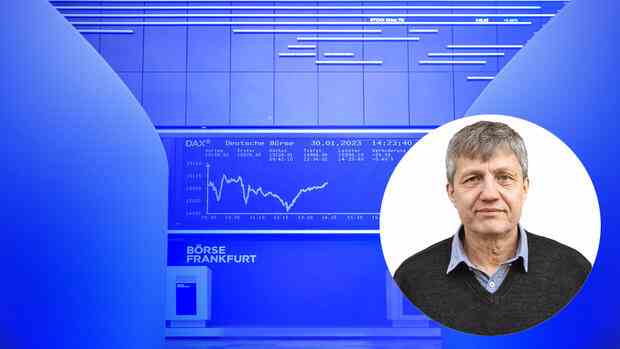Author Frank Wiebe analyzes the market data.
Frankfurt After the recent turbulence, the German stock market started the new week surprisingly stable. Despite all interest rate concerns and the worse than expected business climate in the euro area, the domestic leading index Dax closed on Monday with an increase of 1.1 percent at 15,381 points.
However, the price gains do nothing to change the overall rather unstable condition of the stock market, which could use a little more support after the central banks are no longer helping with low interest rates, but are actually putting the brakes on them massively with their fight against inflation.
The German capital market in particular would need help to achieve a strength that roughly corresponds to that of the German economy. In a special variant of the MSCI World stock index, which is weighted according to gross domestic product, Germany is in third place with a good eight percent behind the USA and Japan. The index does not include emerging markets.
In the normal version, which is weighted according to market capitalization, Germany is only in seventh place between Switzerland and Australia with a share of around 2.5 percent. In the overview of the index provider MSCI, Germany does not appear separately in the normal version, but disappears under the heading “Other”.
This is where the federal government’s planned stock pension comes into play. Pension funds are generally considered to be very helpful for the development of domestic capital markets. They play an important role in Great Britain and Switzerland, for example, but also in the Netherlands. Although these funds generally invest internationally, as regular buyers of securities, they can also play an important role in the home market.
Study: Stock pension does not solve the basic problem of old-age provision
The aim of the share pension is not to support the German stock exchange. The project is intended to help secure old-age provision. The question of whether and how this can be achieved is currently being hotly debated. The result will not only be important for future generations of retirees, but also for the capital market.
>> Read also: Prominent sovereign wealth funds under stress – a bad omen for the German stock pension?
In a study by Fabian Mushövel and Nicholas Barr, published in “Social Europe”, skepticism can be heard. Ultimately, each generation of pensioners can only consume the surplus that the working generation produces, it says.
We can save claims, be it to statutory insurance or to the capital market, but we cannot bury goods for later use like squirrels do for the winter. The conclusion: although the share annuity diversifies the accumulation of entitlements, it does not solve the basic problem.
The study also skewers the problem that German stock pensions are said to be debt-financed, which depresses returns. The model calculation goes like this: With an annual return of 4.3 percent, which the German “nuclear fund” is aiming for, for example, and two percent financing costs, a return of 2.3 percent remains at the end. In order to finance a pension gap of 100 billion euros per year, a fund of 4.35 trillion euros would be necessary – completely utopian.
Debt financing of stock annuity can be risk
So far, the plans of Federal Finance Minister Lindner (FDP) envisage a capital base of ten billion euros, which should increase to 150 billion euros in the next 15 years.
No matter how you calculate: If the share pension is to make a significant contribution to old-age provision, it must be large in volume. It should not be financed too much by debt – also because a price slide could otherwise have devastating effects. But if the project is big enough to work, it could also prop up the German capital market.
More: Lindner’s share pension plan hardly compares to the expensive reforms for baby boomers
